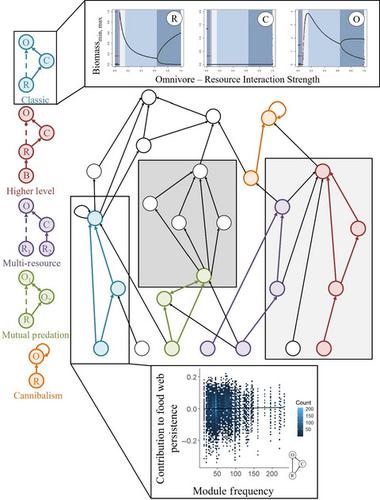当前位置:
X-MOL 学术
›
J. Anim. Ecol.
›
论文详情
Our official English website, www.x-mol.net, welcomes your feedback! (Note: you will need to create a separate account there.)
The multiple meanings of omnivory influence empirical, modular theory, and whole food web stability relationships
Journal of Animal Ecology ( IF 4.8 ) Pub Date : 2020-11-01 , DOI: 10.1111/1365-2656.13378 Anne M. McLeod 1 , Shawn J. Leroux 1
Journal of Animal Ecology ( IF 4.8 ) Pub Date : 2020-11-01 , DOI: 10.1111/1365-2656.13378 Anne M. McLeod 1 , Shawn J. Leroux 1
Affiliation

|
The persistence of whole communities hinges on the presence of select interactions which act to stabilize communities making the identification of these keystone interactions critical. One potential candidate is omnivory, yet theoretical research on omnivory thus far has been dominated by a modular theory approach whereby an omnivore and consumer compete for a shared resource. Empirical research, however, has highlighted the presence of a broader suite of omnivory modules. Here, we integrate empirical data analysis and mathematical models to explore the influence of both omnivory module (including classic, multi-resource, higher level, mutual predation, and cannibalism) and omnivore-resource interaction type on food web stability. We use six classic empirical food webs to examine the prevalence of the different types of omnivory, a multi-species consumer-resource model to determine the stability of these different kinds of omnivory within a module context, and finally extend these models to a 50 species, whole food web model to examine the influence of omnivory on whole food web persistence. Our results challenge the concept that omnivory is broadly stabilizing. In particular, we demonstrate that the impact of omnivory depends on the type of omnivory being examined with multi-resource omnivory having the largest correlation with whole food web persistence. Moreover, our results highlight that we need to exercise caution when scaling modular theory to whole food web theory. Cannibalism, for example, was the most persistent and stable omnivory module in the modular theory analysis, but only demonstrated a weak correlation with whole food web persistence. Lastly, our results demonstrate that the frequency of omnivory modules are more important for whole food web persistence than the frequency of omnivore-resource interactions. Together, these results demonstrate that the role of omnivory often depends both on the type of omnivory being examined and the food web within which it is nested. In whole food web models omnivory acts less as a keystone interaction, rather, specific types of omnivory, particularly multi-resource omnivory, act as keystone modules. Future work integrating module and whole food web theory is critical for resolving the role of key interactions in food webs.
中文翻译:

杂食性的多重含义影响经验、模块理论和整个食物网稳定性关系
整个社区的持久性取决于选择交互的存在,这些交互作用是稳定社区,使得识别这些关键交互变得至关重要。一个潜在的候选者是杂食动物,但迄今为止关于杂食动物的理论研究一直由一种模块化理论方法主导,即杂食动物和消费者争夺共享资源。然而,实证研究强调了更广泛的杂食模块套件的存在。在这里,我们结合经验数据分析和数学模型来探索杂食模块(包括经典、多资源、更高级别、相互捕食和同类相食)和杂食-资源交互类型对食物网稳定性的影响。我们使用六个经典的经验食物网来检查不同类型杂食的流行情况,一个多物种的消费者资源模型,以确定这些不同种类的杂食在模块上下文中的稳定性,最后将这些模型扩展到 50 个物种的全食物网模型,以检查杂食对整个食物网持久性的影响。我们的结果挑战了杂食性广泛稳定的概念。特别是,我们证明杂食的影响取决于被检查的杂食类型,多资源杂食与整个食物网的持久性具有最大的相关性。此外,我们的结果强调,在将模块化理论扩展到整个食物网理论时,我们需要谨慎行事。例如,同类相食是模块化理论分析中最持久和最稳定的杂食模块,但仅显示与整个食物网持久性的弱相关性。最后,我们的结果表明,杂食性模块的频率对于整个食物网的持久性比杂食性资源相互作用的频率更重要。总之,这些结果表明杂食动物的作用通常取决于被检查的杂食动物的类型和它嵌套的食物网。在整个食物网模型中,杂食作为关键交互作用较少,相反,特定类型的杂食,特别是多资源杂食,充当关键模块。整合模块和整个食物网理论的未来工作对于解决食物网中关键相互作用的作用至关重要。这些结果表明,杂食动物的作用通常取决于所检查的杂食动物的类型及其嵌套的食物网。在整个食物网模型中,杂食作为关键交互作用较少,相反,特定类型的杂食,特别是多资源杂食,充当关键模块。整合模块和整个食物网理论的未来工作对于解决食物网中关键相互作用的作用至关重要。这些结果表明,杂食动物的作用通常取决于所检查的杂食动物的类型及其嵌套的食物网。在整个食物网模型中,杂食作为关键交互作用较少,相反,特定类型的杂食,特别是多资源杂食,充当关键模块。整合模块和整个食物网理论的未来工作对于解决食物网中关键相互作用的作用至关重要。
更新日期:2020-11-01
中文翻译:

杂食性的多重含义影响经验、模块理论和整个食物网稳定性关系
整个社区的持久性取决于选择交互的存在,这些交互作用是稳定社区,使得识别这些关键交互变得至关重要。一个潜在的候选者是杂食动物,但迄今为止关于杂食动物的理论研究一直由一种模块化理论方法主导,即杂食动物和消费者争夺共享资源。然而,实证研究强调了更广泛的杂食模块套件的存在。在这里,我们结合经验数据分析和数学模型来探索杂食模块(包括经典、多资源、更高级别、相互捕食和同类相食)和杂食-资源交互类型对食物网稳定性的影响。我们使用六个经典的经验食物网来检查不同类型杂食的流行情况,一个多物种的消费者资源模型,以确定这些不同种类的杂食在模块上下文中的稳定性,最后将这些模型扩展到 50 个物种的全食物网模型,以检查杂食对整个食物网持久性的影响。我们的结果挑战了杂食性广泛稳定的概念。特别是,我们证明杂食的影响取决于被检查的杂食类型,多资源杂食与整个食物网的持久性具有最大的相关性。此外,我们的结果强调,在将模块化理论扩展到整个食物网理论时,我们需要谨慎行事。例如,同类相食是模块化理论分析中最持久和最稳定的杂食模块,但仅显示与整个食物网持久性的弱相关性。最后,我们的结果表明,杂食性模块的频率对于整个食物网的持久性比杂食性资源相互作用的频率更重要。总之,这些结果表明杂食动物的作用通常取决于被检查的杂食动物的类型和它嵌套的食物网。在整个食物网模型中,杂食作为关键交互作用较少,相反,特定类型的杂食,特别是多资源杂食,充当关键模块。整合模块和整个食物网理论的未来工作对于解决食物网中关键相互作用的作用至关重要。这些结果表明,杂食动物的作用通常取决于所检查的杂食动物的类型及其嵌套的食物网。在整个食物网模型中,杂食作为关键交互作用较少,相反,特定类型的杂食,特别是多资源杂食,充当关键模块。整合模块和整个食物网理论的未来工作对于解决食物网中关键相互作用的作用至关重要。这些结果表明,杂食动物的作用通常取决于所检查的杂食动物的类型及其嵌套的食物网。在整个食物网模型中,杂食作为关键交互作用较少,相反,特定类型的杂食,特别是多资源杂食,充当关键模块。整合模块和整个食物网理论的未来工作对于解决食物网中关键相互作用的作用至关重要。



























 京公网安备 11010802027423号
京公网安备 11010802027423号